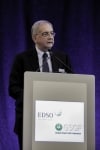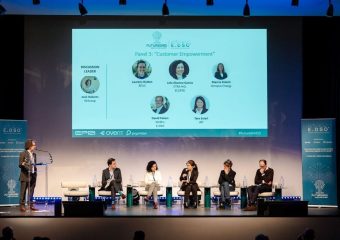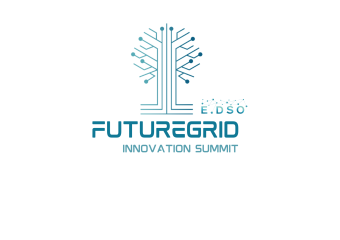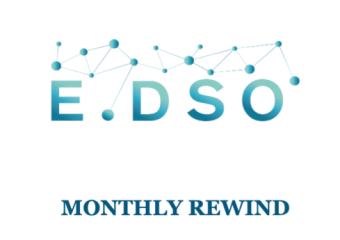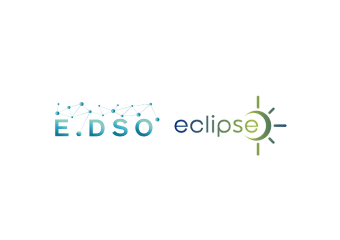Global Smart Grid Conference shows worlwide endeavour to develop smarter grids
The conference, jointly hosted by EDSO for Smart Grids and the Global Smart Grid Federation (GSGF) on 21-22 March, attracted some 160 high level Smart Grid stakeholders from around the world. Here are some highlights from the conference.
Livio Gallo, the chairman of EDSO for Smart Grids, welcomed everyone and opened the conference by highlighting the strong development of larger and larger cities and their need of smart infrastructure in order to efficiently meet the needs of all their residents. He described the important challenges ahead for the development of smart grids and pointed out the need to start now if we want to be ready to face those challenges.
Maria Da Graca Carvalho, member of the European Parliament and rapporteur for the Horizon 2020, the EU framework programme for research and innovation, described the programme and highlighted that it will be a major step forward to push technology innovation led by industry, especially small and medium size enterprises.
Panel on Incorporating Renewables, EV charging infrastructure and Storage
The basis is enabling renewable energy generation to be used at its full potential at the same time as system reliability is ensured. Voltage and frequency deviations are among the identified issues of integrating renewable energy generation and there can be an over-capacity of renewable energy generation for example when there is strong sun and wind during off peak hours. Grid flexibility; active demand and storage facilities is crucial in order to manage the distribution grids.
Electric vehicles charging is a vital part of smart grids, increasing the need for capacity and flexibility. There is not yet a high penetration of electric vehicles on the market, mostly due to shortcomings of battery capacity and that Electric Vehicles are expensive and so far, penetration seems to need economic incentives.
These local grid issues need to be taken into account by the market design with clear objectives within the regulatory frameworks. The regulatory frameworks need to enable research, development and demonstration and motivate industry to find the best solutions. A central question is whether change should be driven by a technology push or a policy pull. The DSO is a central player in this topic, and it is crucial that the customer is involved, directing the innovation.
Panel on Smart metering/Active demand, flexibility and balancing
The smart meter is core to enable active demand, load flexibility and local system balancing in times of need. A smart meter is defined as enabling two-way communications, where other functionalities also can be included, but the definition changes with almost every new smart meter model available. The question is whether to wait for harmonisation of standards or go ahead and invest in one of the available technologies.
Standards and interoperability are important factors for the grids of the future, but it should be designed in a way that permits technological change in the future. There are also other barriers to investing such as a lack of a clear market design, stakeholder roles definition, consumer involvement, and unclear returns on the investments. National and international governments should together with regulators set the market design, clarifying the roles of the stakeholders. Consumers must be able to be aware of their energy consumption and actively participate in the market. There should be incentives so that smart meter roll-out will be profitable for all parties involved in proportion to the risk they take.
The DSOs are at the centre of the smart grids development; their remuneration should incentivise them to invest in smart grids. Regarding the smart grids technology choices, it is best to leave this open, given a clear market design. The regulator needs to be properly advised, by all stakeholders in the system, on their advantages of smart meters.
Keith Sequeira, from the European Commission and the Cabinet of Commissioner Geoghegan-Quinn, referring to the Horizon 2020 initiative, he outlined the role of bringing together research and innovation in order to meet the challenges of the future.
Panel on Control ICT Technology, data and information security
Smart metering opens up a world of possibilities in terms of data availability; the amount of information that could be collected is so massive that the information management itself becomes a challenge. New technologies are important and can provide increased functionality at a lower cost and information management system should integrate the needs of both technical and market aspects. What information gets transmitted and how it adds value to consumers and market participants is also essential for the design of the information management system. The proposed solution is to decentralise information and manage it from the bottom up, so that only key aggregated data reaches the top of the operational chain.
Consumers should be informed of the value for them of sharing their data, trust must be established allowing operators to handle their data and the issues of security and privacy must be discussed. Communication in the smart grid will involve a trade-off between functionality, security, performance and cost. Certain security standards must be enforced and the user or operator should then be enabled to choose whether a higher level of security is needed. The goal of these technologies is the integration of renewable energy and demand participation in order to ensure a sustainable, reliable electricity supply for the future.
Panel on Business objectives and market organisation
The implementation of smart grids represents an industry-wide change that will affect all the involved stakeholders, from generation to distribution and the consumers. The European electricity industry is different, having certain activities liberalised, generation and sales, while others, transmission and distribution, are recognised as natural monopolies and regulated. It is essential to clarify the benefits for each involved stakeholder.
Key factors are establishing dynamic price signals that enable efficient use of the smart grid and to make policy allowances that permit the DSOs to reap rewards for pushing the smart meter roll-out forward. Allowing regulated network actors to participate in market activities and perceive the benefits of a free market actor, would further motivate DSO involvement in the smart grid implementation and customer involvement.
Customer involvement is crucial. The energy sector needs to understand what creates value for customers and the customer needs to understand what is going on in the energy sector, what the benefits are of being active, for example implementing a smart system in their homes, and the consequences of doing nothing. But only certain gains from smart grids can be monetised, the rest are societal gains. The industry needs to move from being a “confusopoly” to creating value for consumers and nations.
Paddy Turnbull, the chairman of GSGF, closed the conference, calling for initiatives in consumer awareness and grid modernisation that will allow us to turn the global smart grid challenges into successes.

